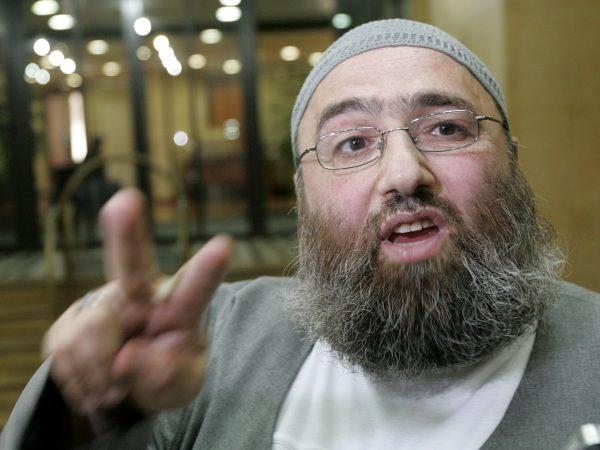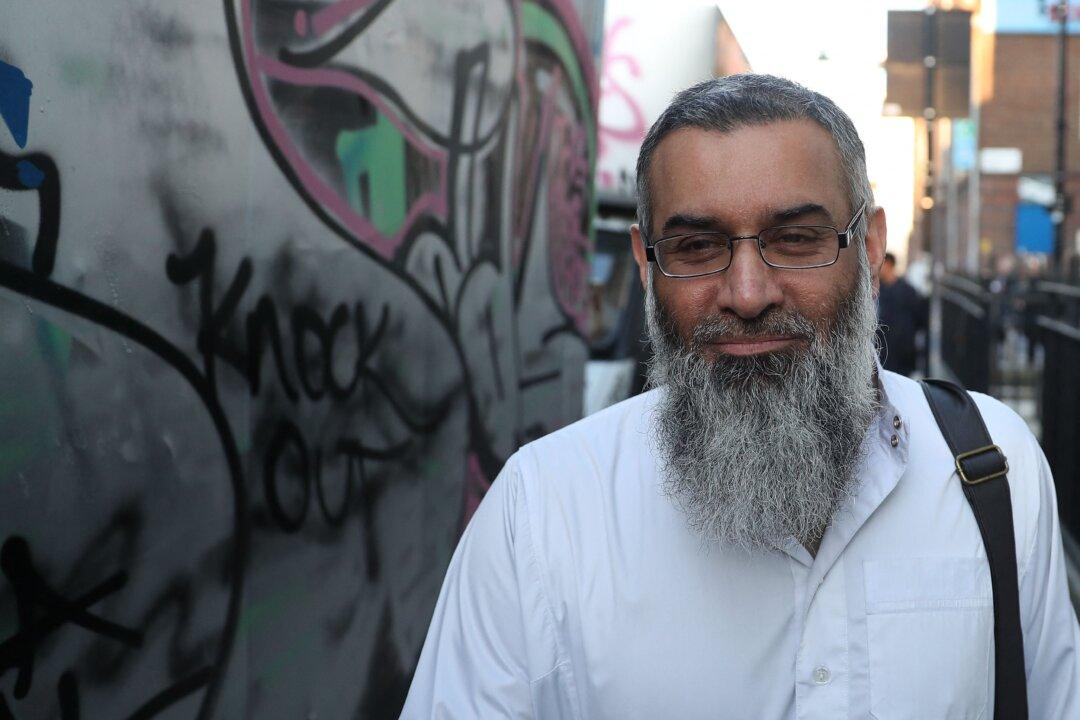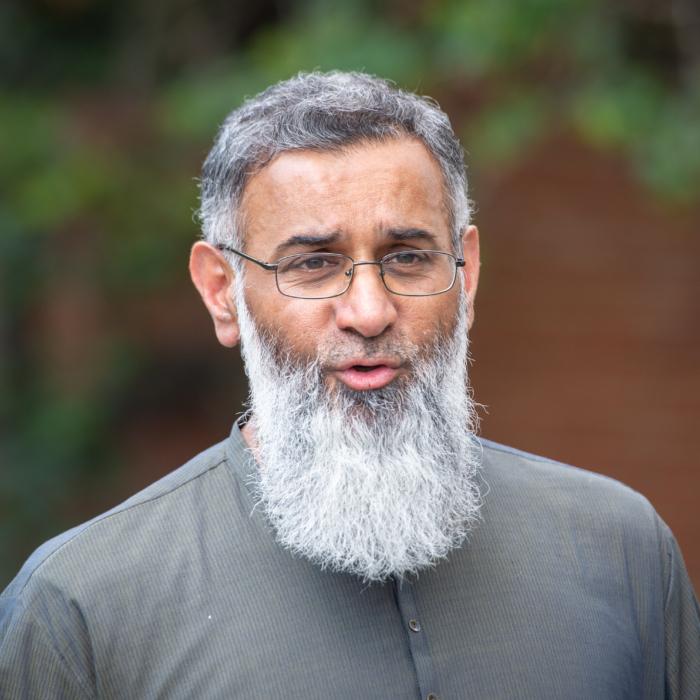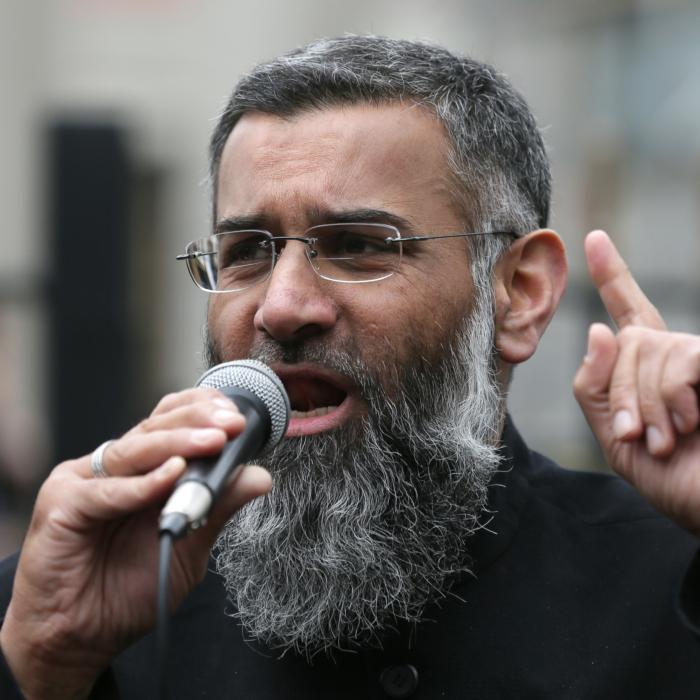Choudary, 57, was convicted on Tuesday of directing a terrorist organisation and addressing meetings to encourage support for the group.
In it, he wrote that Al-Muhajiroun’s ultimate aim was to establish a khilafah, or caliphate, which is a fully Islamic state, in Britain.
British Government ... Has Failed to Eliminate It
He added: “The British government has tried to eliminate the network for years. This pressure has weakened the activist network, but failed to eliminate it.”Mr. Kenney said one reason for this failure was the network’s “adaptability.”
Among the many guises which Al-Muhajiroun has been known as is Al-Ghurabaa (The Strangers), which the Home Office says “disseminates materials that glorify acts of terrorism,” and The Saved Sect.
In 2004 Omar Bakri Muhammad—a Syrian-born jihadist who moved to Lebanon from Britain in 2005 and was then banned from returning by then-Home Secretary Charles Clarke, who ruled his presence was “not conducive to the public good”—disbanded Al-Muhajiroun.
Choudary has previously said he did this because of a shift in ideology.
But the organisation would not go away.
Eleven different groups affiliated to Al-Muhajiroun were proscribed by different home secretaries between July 2006 and June 2014.
Prosecutor Tom Little, KC told the jury at Choudary’s trial that in January 2010, then-Home Secretary Alan Johnson decreed that Al-Ghurabaa and The Saved Sect were to be considered as alternative names for Al-Muhajiroun (ALM).

ALM’s ‘Chameleon-Like Abilities’
Mr. Little said, “There were a number of other names that were to be treated as alternative names for ALM, further revealing ALM’s chameleon-like abilities.”The prosecutor said Al-Muhajiroun was a “terrorist organisation that has been banned in this country for many years because of the dangers that it poses.”
He said: “That organisation has been known over the years by a number of different names but most particularly it was known as Al-Muhajiroun (ALM). Whatever its name or whatever its cloak it was ALM either in name or in another name at the time that you are considering.”
- Belong to or invite support for a proscribed organisation.
- Arrange or assist with the arrangement of a meeting that supports a proscribed organisation.
- Address such a meeting.
- Wear clothing or display articles in public which arouse suspicion of membership or support of a proscribed organisation.
One of the guises that Al-Muhajiroun reportedly used was the Islamic Thinkers Society (ITS), which was described at Choudary’s trial as being its U.S. branch.
In October 2021 Choudary’s co-defendant Khaled Hussein, who lived in the Canadian city of Calgary, who was found guilty of being a member of Al-Muhajiroun, “mentioned that ALM was the ‘mother group’ of ITS.”
In February 2023, he sent WhatsApp messages in which he stated, “we’re the remnants of Al-Muhajiroun.”
But the United States has a different system to Britain.
At his trial, Mr. Little said of Al-Muhajiroun, “Anjem Choudary has been a member of that organisation for many years and he also directed that terrorist organisation for a significant period of time from 2014 onwards and more recently he has also encouraged support for that organisation by addressing meetings of the Islamic Thinkers Society.”
“At the time that he did so the Islamic Thinkers Society was, we say, part and parcel of the same terrorist organisation, so that is ALM,” he added.
Mr. Little said: “Terrorist organisations are not like a sports club or a gym where you sign up for membership, and pay to be a member. There is no membership card or proof of membership on a mobile telephone in, say, an app.”
“Nor is a list of members of a terrorist organisation put on a board outside a building or published on a website,” he added.
Mr. Little said: “Terrorist organisations, for reasons that you may think are obvious, may lurk in the shadows seeking to avoid detection, investigation, and prosecution. They try to stay hidden or they may even give the impression that they are no longer active or they may want some people to think that they are no longer associating with others with a terrorist cause.”
“It is in the interests of a terrorist organisation to move and to develop undetected and remain, if possible, below the water line,” he added.
Choudary Claimed ITS and ALM Differed in Ideology
He denied ALM existed and said, “You cannot say they [ITS] are ALM” because they differed in ideology, structure, and methodology.So what is to be done to prevent another form of Al-Muhajiroun even as Choudary sits in a prison cell?
Mr. Kenney, in the 2019 report, suggested that rather creating a “bristling armoury of counter-terrorism laws,” the way to erase Al-Muhajiroun and its sympathisers was to use “former activists,” who, he said, “have the knowledge and experience to counter The Emigrants’ narrative.”
He said, “They could engage and debate persistent activists, who they are not likely to change, and young supporters, who they just might.”
But Mr. Kenney concluded, “There is no silver bullet solution to Al-Muhajiroun.”
“The suggestions offered here may help contain activists, but they are not likely to eliminate them. With their strong ideological orientation, The Emigrants, along with the larger ISIS and al-Qaeda affiliated movement, remain as much a state of mind as a specific collective,” he added.







